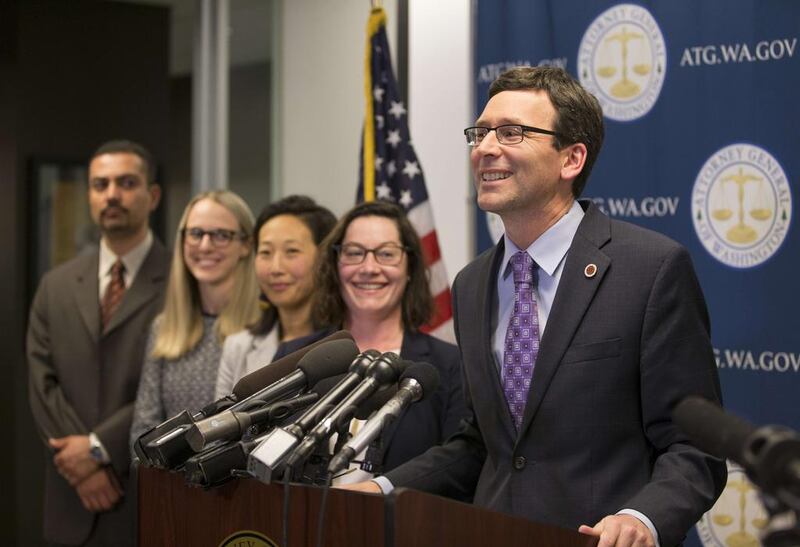NEW YORK // President Donald Trump on Friday promised to introduce new national security measures after federal judges refused to reinstate his travel ban, a “political decision” he said his administration would continue to challenge in court.
“We’ll be doing something very rapidly having to do with additional security for our country,” Mr Trump said at a White House news conference with Japanese prime minister Shinzo Abe. “You’ll be seeing that sometime next week.”
“In addition we will continue to go through the court process, and I have no doubt we’ll win that particular case,” he said.
After his travel ban was successfully challenged by a lower court in Washington state, the three federal appeals court judges dealt Mr Trump a further setback by unanimously ruling there was no reason to uphold his travel ban on seven mainly Muslim nations, saying there was no evidence of a risk to national security.
They declined to overturn the injunction imposed by the lower court, dismissing government arguments that the president could not be overruled on security matters. Mr Trump responded immediately with an angry tweet in capital letters: “SEE YOU IN COURT, THE SECURITY OF OUR NATION IS AT STAKE!” and promising to take further legal action. But Bob Ferguson, Washington state attorney general, was jubilant.
But Bob Ferguson, Washington state attorney general, was jubilant.
“Bottom line, this is a complete victory for the state of Washington,” he said. “The 9th Circuit Court of Appeals in a unanimous decision effectively granted everything we sought.”
Mr Trump’s opponents reacted with glee, saying the ruling reasserted the limits of Mr Trump’s power after he repeatedly used Twitter and public statements to condemn judges who ruled against him.
The three judges of the San Francisco-based 9th US Circuit Court of Appeals said government lawyers failed to offer evidence of “irreparable harm” if the ban on arrivals from Iran, Iraq, Syria Sudan, Somalia, Libya and Yemen were not reimposed.
“The government has pointed to no evidence that any alien from any of the countries named in the order has perpetrated a terrorist attack in the United States,” they wrote. “Rather than present evidence to explain the need for the executive order, the Government has taken the position that we must not review its decision at all.”
The Trump administration must now decide whether to take the case to the Supreme Court, mount a challenge in a lower court or attempt to revise the executive order. The Justice Department said it was still considering its next move.
Hillary Clinton, whose political career ended in defeat at the hands of Mr Trump in November, posted a simple Tweet making reference to the unanimity of the decision. “3-0,” is all it said.
Tightening controls on immigration was a signature issue of Mr Trump’s unlikely run for the White House. During the campaign he promised to ban the entry of foreign Muslims to the US, although he later watered down the proposal.
At the end of his first week in office he signed an order indefinitely suspending the arrival of Syrian refugees and halting for 90 days the entry of travellers from seven countries on security grounds.
Protests erupted at airports and dozens of legal complaints were filed on behalf of people detained or deported.
The state of Washington argued that the executive order had directly harmed students at its universities and divided families by stranding people overseas. Reintroducing the ban would bring fresh chaos, it said.
It also claimed the executive order’s focus on Muslims contravened constitutional protections for religious groups.
The emergency ruling, delivered 48 hours after the two sides presented 30 minutes of evidence, does not answer all those questions. Instead, the judges were ruling on whether the ban should be suspended while the legal cases proceeded.
In a strongly worded passage, they dismissed the government’s argument that judges had no right to review the president’s national security policy, saying that was “contrary to the fundamental structure of our constitutional democracy”.
Their overall decision was based, they said, on the likelihood that the government would ultimately lose when the full arguments were heard.
That may make the Supreme Court reluctant to hear a further appeal. Legal analysts say it prefers to hear cases only after all the issues are settled in the lower courts.
Campaigners said they would keep fighting the proposed ban but welcomed a stay which they said made sure families could be reunited on American soil.
Javier Valdés, co-executive director of Make the Road New York, which has led protests, said, “The fact that judges appointed by both Republican and Democratic presidents agreed to continue blocking this executive order demonstrates that this is not about party politics.”
However, Margaret Huang, of Amnesty International, said the ruling would not end the turmoil and uncertainty for thousands of families.
“We’re concerned by reports that some border patrol agents are still subjecting people entering the US to discriminatory and unlawful treatment, and we fear that the Trump Administration may find other ways to discriminate based on religion,” she said. “Congress must step in and end this dangerous and discriminatory ban once and for all.”
foreign.desk@thenational.ae





